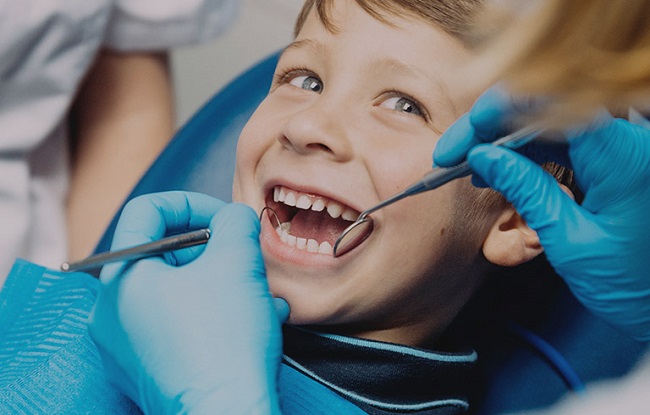Children need healthy teeth to chew well, to speak clearly and for a bright smile. As a parent you can make a lifetime of good health a reality for your child if you let him or her off on the right track early, in fact good oral health begins with you.
How do my child’s teeth develop?
Your baby’s teeth start to appear sometime between 6 months and one year of age.At around three years of age most children have a complete set of 20 teeth.
Your child will start to lose his or her baby teeth at around 6 years of age.The process of replacing the primary teeth with the permanent occurs until 12 to 13 years of age. With the eruption of the wisdom teeth around 16 years or later he or she will have a complete set of 32 teeth.
How can I keep my child’s teeth cavity free?
- Proper brushing
Children are the most risk for cavities.The process of replacing the primary teeth with the permanent teeth occurs over a period of time. As a result your child will have larger
permanent teeth growing next to smaller primary teeth.This unevenness creates areas for food and plaque to collect. Children below 8 years are unable to brush their teeth adequately. So it is important that they are helped to brush their teeth properly with a fluoride toothpaste twice a day.
- Healthy diet
Sugary food and drinks are the culprits in tooth decay and it is best to guide children away from them. Reduce the number of times they have them during the day and insist they rinse their mouth after each intake of food and drink. Include fresh fruits and vegetables in their diet.
- Should my children floss their teeth?
Flossing can be started when two teeth begin to touch.Although you may have to help them at first they will soon learn to do it themselves. It is also easy to include flossing as a part of the daily routine when the child is introduced to flossing early.
- What is fluoride ? Will my child benefit from it?
Fluoride is a natural mineral that helps strengthen tooth enamel. We all have bacteria in our mouth all the time. They live on the food that is left in the mouth and produce acids as a waste product. The acids attack the teeth by dissolving the minerals on the tooth surface.
Luckily the minerals in the saliva can mend the teeth when decay first starts , but the mending process takes minerals like fluoride to take place.
Fluoride can be administered systemically or topicaly [on the surface]. Sources of systemic fluoride are drinking water tablets etc. Topical application of fluoride is through
The use of toothpaste , mouthwash ,etc.
Professional application of fluoride can be done using fluoride varnishes ,gels etc. It is usually done semiannually.
- What are fissure sealants? How can they help?
Fissures are grooves on the chewing surfaces of back teeth. They are difficult to keep clean ,so there is a risk of decay. Fissures can be sealed with tough plastic to
protect them. The plastic is runny at first but sets hard .Ask your dentist for details.
- What should I do if my child’s permanent teeth do not come in straight?
Teeth that do not come in straight often make cleaning difficult. You may also want to discuss specific treatment plans to straighten teeth before all permanent teeth have erupted. You may be referred to an orthodontist , a dentist who specializes in correcting jaw and teeth irregularities.
- When should my child start to see the dentist ? What can I expect?
This should be scheduled at around six months of age or when he or she gets her first tooth.Your dentist will check the teeth and gums for any problems and will also tell you how to take care of them.You can also use the opportunity to ask any questions about tooth development, care, etc.


